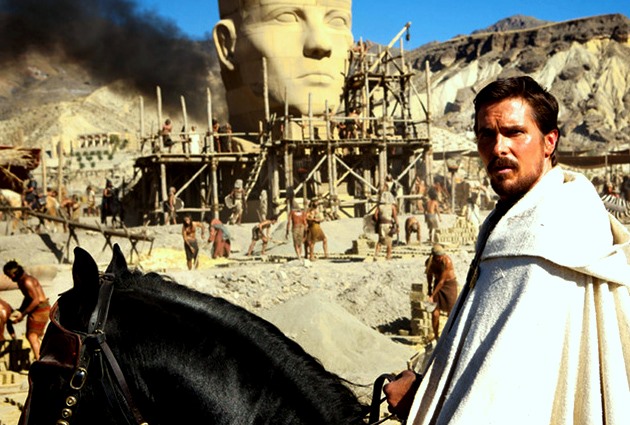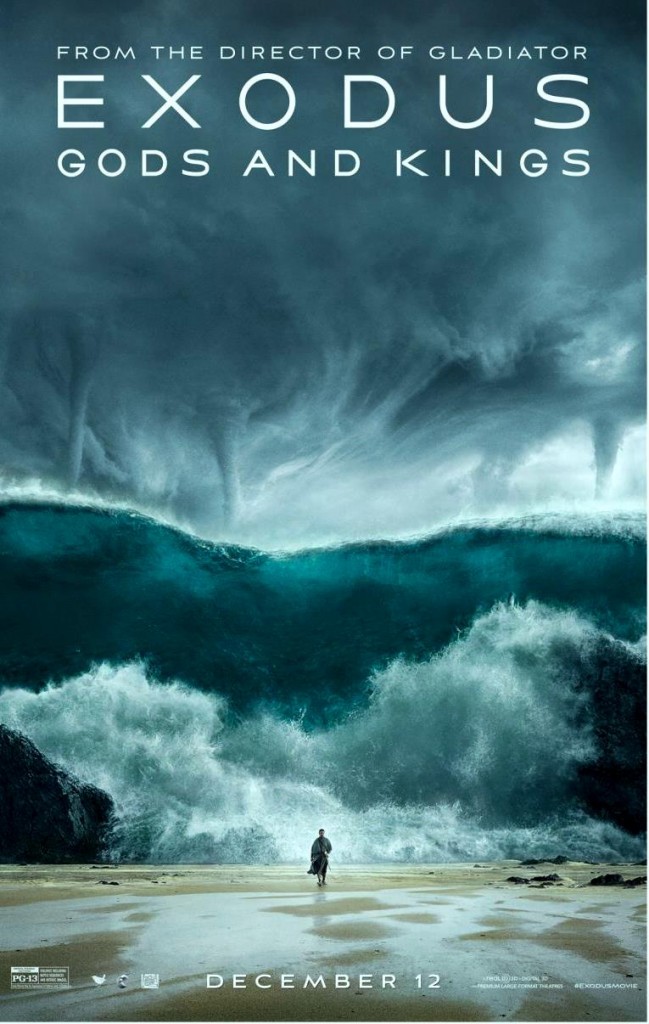
The most intelligently written of Ridley Scott’s old century epics. Exodus: Gods and Kings attempts to undo some eighty years of Hollywood whitewashing, particularly 1956’s heavily mythical “The Ten Commandments,” which might still be good as a young children’s watered down social studies assignment but is obsolete to me now. The film opens with the Scriptures truth, that Moses (Christian Bale) was a warrior, that the Israelites had been enslaved for 400 years under the Egyptians, and the dying ruler Seti (John Turturro) did prefer Moses as comrade over his own avaricious son Ramses (Joel Edgerton).
Rumor abounds that Moses has Jewish blood, and that his own parents had been slaughtered for their heritage. For several reasons, including some smart [Hollywood] dramatizations, Moses is cast out of Egypt. Moses dispatches two assassins outside of the city – it’s a scene that could have been handled more excitingly – and ganders his way into a small village and chooses a wife in Zipporah (Maria Valverde, in a role half-sketched). It’s already a long movie at this point but – Moses has an accident, beckons a vision, and compulsively begins a campaign to exodus the enslaved people of Egypt – all the slaves seem to be city builders, for drama purposes, instead of house servants. In the big scenes, the plagues arrive to ruin Egypt, to punish the King and slaveowners for their transgressions. This is part not of Moses’ magic staff power but of natural circumstances? Scott and his co-writers Steven Zallian, Bill Collage, Adam Cooper suggest that.
The revolutionary piece of revisionist thinking behind “Exodus” owes significantly to 1988’s “The Last Temptation of Christ.” I know that was the first film that made me aware that my understanding of the old world had been whitewashed with beatific, heavenly figures and polished gloss – not just films like the sanctimonious “King of Kings” (1961) but education books in our schools. The 1988 Scorsese film was the first that dared to put a stark, brutal spin on Jesus’ time – it said, these times were chaotic and uncivilized. Since then, there’s been a slow but decisive change to make period films more harsh, cruel, real. “Noah” from earlier this year was unsuccessful if turgid, but at least it was ambitious.
Bale is being targeted by critics, and pundits who haven’t seen the film yet, as a ridiculous choice for Moses. I am not one of them. Bale is already so self-critical of himself, in how he deals with the doubts in his own characters, that I’m captivated by whatever role he takes on. Bale is right for Moses, and for every movie, for that and because he is severely self-torturing. Edgerton is a big-headed ruler, and a crueler successor than his father – and he’s good. I admired that Scott put in scenes of Ramses hanging an entire family of scapegoats. The rest of the casting in “Exodus” isn’t flawless, but it’s not bunkum either. Roland Emmerich films are bunkum.
Scott and company care to make statements, some of them anachronistic. But I agree with the libertarian message of the film: Simply put, every ugly war and prejudice has begun because of religious motives. Some of you might be atheist and just come for the spectacle: Those plague scenes in sword and sandal epics are usually cheesy, but Scott brings grandeur and tangible lifelikeness in the scene of frogs and locusts hording the city. The curse of all pharaohs’ male first-borns murdered like they came from an angry God? Not left out by Scott, but not explained either. The parting of the Red Sea? I’ll take Scott’s practical version of the phenomenon over Cecil B. DeMille’s outlandishness. Again and again, I appreciated the intelligent writing that I’m convinced was accomplished through erudite research, even though I’m never going to be entirely convinced – though I might be inspired now to go read some fat historical volumes on The B.C. Times which I’m sure are as dry as some of Scott’s film. As cinema, “Exodus” does not equal the entertaining sweep of Scott’s “Gladiator,” however. It does have some occasionally thrilling torrents nonetheless. So there you have it.
142 Minutes. Rated R.
DRAMA /REVOLUTIONARY MINDS /WEEKEND FOOD FOR THOUGHT
Film Cousins: “The Ten Commandments” (1956); “The Last Temptation of Christ” (1988); “Kingdom of Heaven” (2005); “Noah” (2014).





